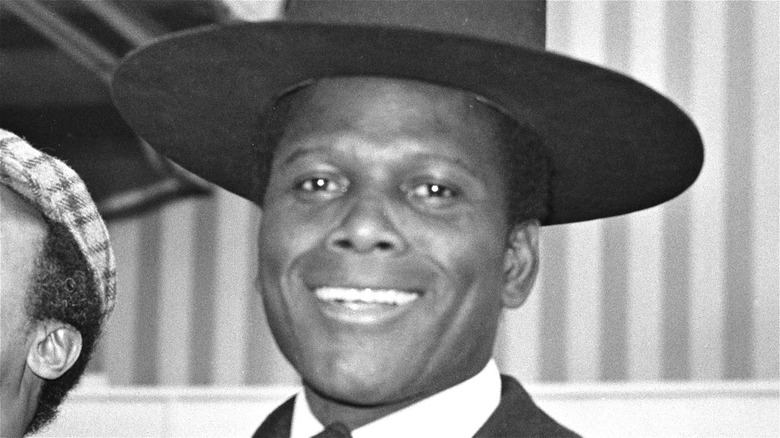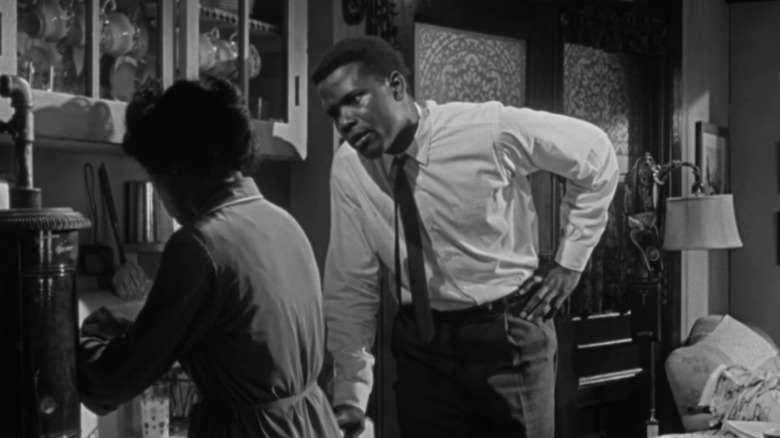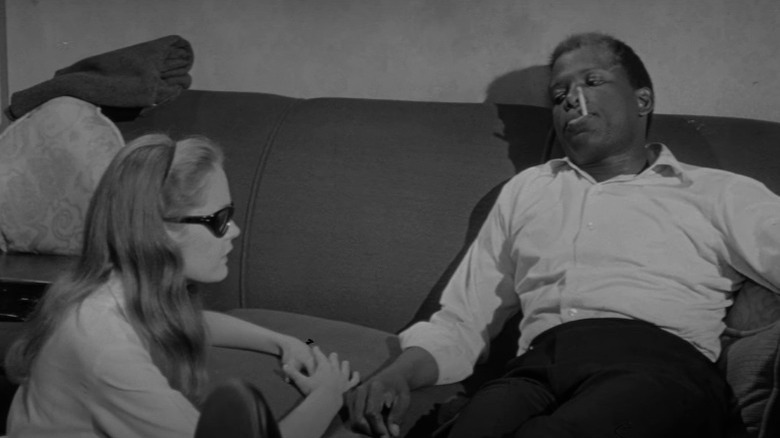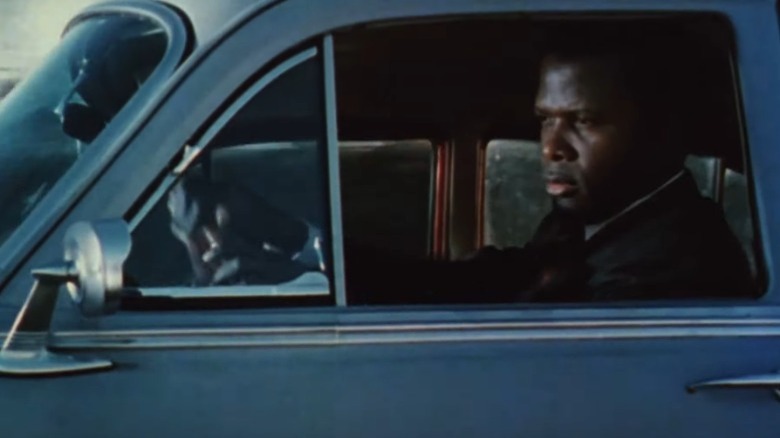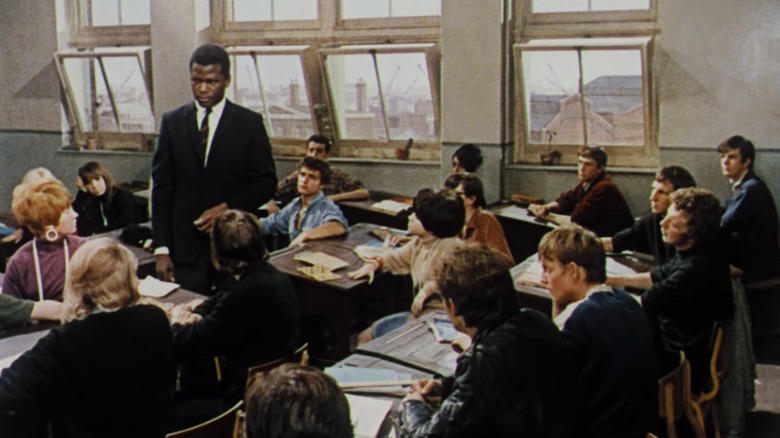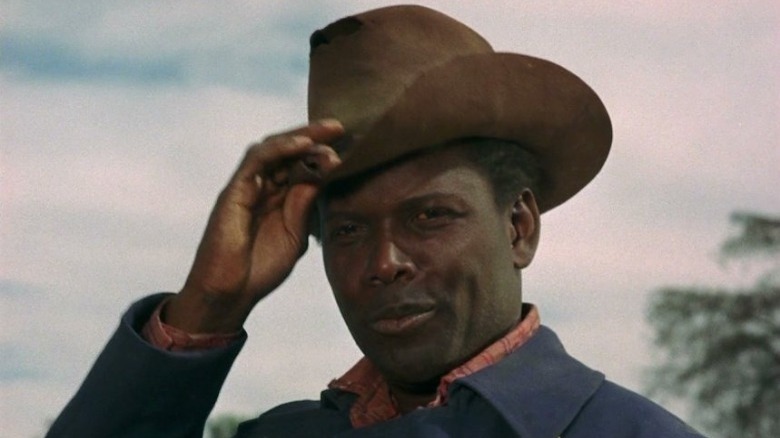The Best Sidney Poitier Movies And How You Can Watch Them
The late Sidney Poitier is nothing short of a titan of worldwide film history. He is, of course, widely reputed for his many glass ceiling-shattering "firsts" as a Black actor: The first to become a mainstream Hollywood leading man, the first to be nominated for the Academy Award for Best Actor, the first to win the Academy Award for Best Actor, the first to be cast in non-ethnically-specific starring roles (via TheWrap). But there's much, much more to Poitier's life and artistry than just the barriers he had to overcome.
In fact, anyone acquainted with the work of Sidney Poitier knows that, in addition to the legendary grace, poise, and charisma of his screen persona, he was also one of the United States' sharpest, most skillful, hardest-working thespians. He was made for big roles and earned them, but every Poitier performance, no matter how big or small the role, sings with the unmistakable passion of a man who loved the craft of acting down to his bones.
It's hard to talk about "highlights" in the career of a figure who centralized so much of what was great and exciting about American cinema in the mid-20th century — but even a performer as consistent and winning in his project choices as Poitier had moments in which he shone brightest. If you're looking to dive into the genius of this screen giant, read on to learn more about his greatest films, with additional info on where you can watch them.
A Raisin in the Sun is the greatest screen adaptation of the classic play
Lorraine Hansberry's "A Raisin in the Sun" is such a foundational text in modern American theater that it's a bit startling to look back and realize it was first performed on Broadway in 1959. For today's theatergoers, "A Raisin in the Sun" is an integral piece of the canon that feels like it's always been there; when it was first adapted to screen in 1961, however, it was still a fresh play from a breakthrough dramaturge.
The 1961 film version (Rotten Tomatoes score: 95%), scripted by Hansberry herself and directed by Daniel Petrie, brought over nearly all of the original Broadway cast — including Sidney Poitier. The Bahamian-American actor was already on the rise at the time, but "A Raisin in the Sun" took things to a whole new level. Playing ambitious limousine driver Walter Lee Younger, whose resolve to invest his late father's life insurance money in a liquor store places him in conflict with his mother (Claudia McNeil), wife (Ruby Dee), and younger sister (Diana Sands), Poitier gave voice to a whole generation of young Black men trying to make the best life for themselves and theirs amidst a society that made things harder at every turn. Countless adaptations of Hansberry's masterpiece have been filmed since, but none of them pulse with the same vigor and the same sense of historical urgency of the original.
You can stream the movie on the Criterion Channel, or rent/buy it individually on Prime Video, iTunes, Vudu, Google Play, YouTube, or DirecTV.
A Patch of Blue is an unusually sensitive interracial romance for its time
As he began to gain recognition among white American audiences, Sidney Poitier became a kind of go-to avatar for a concept that was omnipresent in the public imagination during the Civil Rights era: The kind, dignified Black man whose existence acted as a rebuttal to the wails of virulent racists and the anxieties of less virulent ones. He played roles within that purview in a number of his most famous films: "The Defiant Ones," opposite Tony Curtis; "Guess Who's Coming to Dinner," opposite a white family spearheaded by Katharine Hepburn and Spencer Tracy; and even his Oscar-winning role, "Lilies of the Field," opposite a cadre of European nuns.
Though all those films had their merits, most of them having to do with Poitier's invariably lived-in, three-dimensional work, his best film in that "racial conciliation" era is arguably "A Patch of Blue" (RT Score: 89%). Instead of sketching out a sweeping allegorical framework to school white audiences on the humanity of Black people, this 1965 two-hander takes the more nuanced route of a sensitive, patiently developed romance. Poitier plays Gordon Ralfe, an educated office worker who begins a friendship with Selina D'Arcey (Elizabeth Hartman) — a poor, blind young woman struggling to escape an abusive household. Their friendship eventually blossoms into something more, leading to kissing scenes that were cut in some Southern states (via The New York Times).
Thankfully, all Americans can now rent or buy it, kissing scenes included, on Prime Video, Google Play, YouTube, or Vudu.
In the Heat of the Night is a New Hollywood masterpiece
"Bonnie and Clyde" is often cited as a watershed film for the New Hollywood era, but another 1967 release that was arguably just as crucial in precipitating the renaissance of American cinema was "In the Heat of the Night" (RT Score: 95%). This Norman Jewison-directed crime drama, adapted from the eponymous John Ball novel, was something wholly new at the time. It was a gritty, propulsive genre picture that neither shied away from the realities of racism and Southern social malaise, nor made those things the entire point of its storytelling.
Indeed, the tale of Philadelphia detective Virgil Tibbs (Sidney Poitier) reluctantly teaming up with racist police chief Bill Gillespie (Rod Steiger) to investigate a homicide in the Deep South is as notable for its pulse-pounding effectiveness as a murder mystery as for its potent, nation-rattling observations on the nature of racial animosity in 1960s Mississippi. Enormously successful among both white and Black audiences, the film birthed one of the most iconic lines in all of American cinema — Poitier's righteous "They call me Mister Tibbs!" — and won Academy Awards for Best Picture, Best Adapted Screenplay, and Best Actor, not for Poitier but for Steiger. America was ready to cheer on a Black man slapping his racist aggressor back, but it was not yet ready to give him an Oscar for it.
Viewers can stream "In the Heat of the Night" on Hulu, Roku, DirecTV, IndieFix, or Cinemax Go — or buy/rent it on Prime Video, iTunes, Redbox, Vudu, Google Play, or YouTube.
To Sir, with Love is the grandfather of all inspirational teacher movies
The genre of "inspirational teacher" films never seems to get old. There's always a new spin to put on the basic format of a generous, clear-eyed mentor rousing their pupils to heightened consciousness. All you really need to make it work is a star who's convincing as a source of inspiration — be it Robin Williams, Whoopi Goldberg, Edward James Olmos, Embeth Davidtz, or Jack Black.
Unsurprisingly, the grandfather of all such films may be one starring Sidney Poitier, that most inspirational of figures in our cinematic iconography. 1967's "To Sir, with Love" (RT Score: 90%) saw Poitier cross over to the United Kingdom for the part of Mark Thackeray, an immigrant from British Guiana who accepts a job as an interim teacher at an inner-city London secondary school. Although teaching is not Thackeray's primary calling (he's studied to be an engineer) and his class's troublemaking antics prove challenging in the short term, he eventually manages to find inroads into the hearts and minds of the rebellious London teens. In both Thackeray's tense negotiation for the class's respect and the shining model of honor and solidarity he eventually becomes for them, the film proves a remarkably heartwarming and triumphant early entry into its subgenre — and a quintessential Sidney Poitier film.
You can stream it on TCM, rent it from iTunes, Prime Video, YouTube, Google Play, Redbox, or DirecTV, or buy it from any of those services plus Vudu.
Buck and the Preacher shows a different side of Sidney Poitier
Sidney Poitier is primarily remembered as a dramatic actor, but the great, underrated 1972 neo-western "Buck and the Preacher" shows that he also had an incredible knack for comedy. And that must have been something he was itching to get out of his system, too, because "Buck and the Preacher" was also Poitier's first effort as a director.
The film tells of a wagon master (Poitier) and a phony preacher (Harry Belafonte) who partner up to lead freed slaves to safety while shooting down all manner of wicked white raiders. Poitier, replacing ill-suited original director Joseph Sargent, later said of the experience that "After three or four takes of that first scene, a calm came over me. A confidence surged through my whole body... and I, as green as I was, had a touch for this new craft I had been courting from a distance for many, many years" (via Movies! TV Network).
That confidence certainly shows in the final product. In addition to being a pioneering Black-led Western, "Buck and the Preacher" is a proper romp — a thrilling, rollicking adventure story-slash-buddy movie, as effortlessly charismatic as its maker. Although a box office disappointment at the time, the film has since become a cult favorite; even legendary New York Times critic Vincent Canby celebrated its display of "talent for easy, unguarded, rambunctious humor missing from [Poitier's] more stately movies."
Stream it on Starz or Spectrum, or rent/buy on Amazon, Vudu, iTunes, Google Play, DirecTV, or YouTube.
